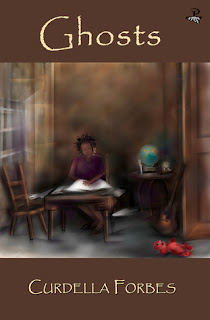 Ghosts
GhostsCurdella Forbes
2012
179 pages, fictional memoir, speculative, psychological
Many thanks to Peepal Tree Press for providing a review copy of this novel.
In a future marked by massive environmental changes, a family from the fictional Caribbean island of Jacaranda comes together to write about their brother many years after his death.
This is a strangely mixed book. Is it a memoir? Is it fantasy? Is it a myth? I think it’s all of those. But more than that, it's a beautiful piece of writing.
Grief
This is a book about grief. Grief and guilt. Each of the siblings is sad about their brother’s death, and afraid that they could have done something to prevent it. Evangeline, the Seer in the family, knows what will happen beforehand: could she have stopped it? Their mother was worried about Pete for years, but no one else listened to her. Should they have? When they disapproved of his actions and his personal life what should they have done? Should, should should should.
The major source of this guilt is the family's treatment of Pete when he was alive. His star-crossed, taboo infatuation with a cousin caused deep rifts in the otherwise (at least on the surface) tight-knit family. Later, when he married a woman that his family did not approve of, the family split into factions, led by: his mother, who forbid her daughter-in-law from entering the house; and Evangeline, whose enlightened knowledge places her on a different spiritual field. This leads to the effective ostracism and isolation of Pete, something that the whole family bitterly regrets after his death. In many ways, this is a cautionary tale: don't let your personal disapproval get in the way of a relationship with your relatives.
Truth and lies
Another theme of this novel is the shifting boundary between truth and lies. Micheline, the main narrator and compiler of these different accounts, is a writer, so her family considers her extremely untrustworthy because she “tells lies” all the time. This is interesting for several reasons: first, for the ethnographic information this provides (in Jamaica writers aren't trusted because they tell stories? Fascinating); and second, because it is impossible to tell how much these accounts tell the truth or have come to us unchanged, since Micheline is organizing and compiling them.
Other characters struggle with the tension between lies and truth. Pete’s stepdaughter is characterized as a compulsive liar, but she is also overwhelmingly compelled to tell the truth. The only witness to Pete's death, she keeps changing her story to avoid giving testimony in court. Why? Because it might get her mother into trouble. But at the same time, she felt the need to confess to Evangeline, to tell her the whole truth from beginning to end. Even when she finally tells it (to Beatrice, a different sibling), she can't find any rest. She is constantly haunted by her inability to support her stepfather, and she haunts his grave and Evangeline in a useless attempt to find peace.
As a Seer, Evangeline knows the Truth. She has visions of the future, and because of her travel and anthropology studies, has a clearer understanding of the world than the rest of her family. Despite this, she is constantly in doubt. What if she is wrong? Where does this intuition come from? Should she just accept what her family members believe to be accepted? If she is proven wrong, her family would think she was lying and she would never be trusted, just like Micheline.
As a novel
This is a strangely structured book. It is apparently conceived as a "family album": a compilation of memories/stories from each of the siblings. Unlike other books of this type, the author never tells you exactly who is talking. This information is left to the reader to uncover, and it is sometimes difficult.
The genre of the novel seems to change rather abruptly in the last section. From a fictional memoir set in the near future, it changes into a more explicitly speculative fictional story. These parts don’t hold together in any logical way, but I don’t think they are necessarily supposed to.
What unifies this book is the beautifully lyrical writing, which slides smoothly between standard English and Jamaican creole. This is not something I had seen before, so it took me longer to read the book because I often had to figure out the meaning of the words or phrases. But this is a good thing; each sentence is so beautiful that it just asks you to read slowly, savoring every turn of phrase. I highly recommend this novel for its beautiful, unique writing – even if I still don’t quite know what it all means.
Further Reading:
"'a community of the self': A Conversation with Curdella Forbes" by Sheryl Gifford (small axe salon)
No comments:
Post a Comment